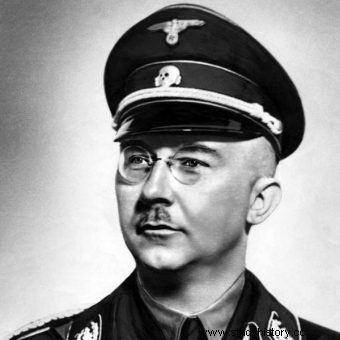
Himmler (photo:Bundesarchiv, Bild 183-R99621, CC-BY-SA 3.0)
Heinrich Himmler
War criminal, one of the leading Nazis; co-founder and head of the Gestapo. He was born in 1900 in Munich to a Catholic bourgeois family. His father was a teacher and conservative. Young Heinrich he did not show any inclination to violence. He was fascinated by the army and military. After the outbreak of World War I, in 1915, he underwent military training, but ultimately did not make it to the front. He also failed to enroll in an officer's course.
Two years later, with his father's consent, he gave up his studies and joined the army in 1918. He referred to the German struggle as the "holy struggle". After the war, he had problems with the law - he was suspected of the murder of the prostitute he lived with. In 1919, he gave up his military career and enrolled in agricultural studies, but he continued to maintain contacts with paramilitary groups. He joined the NSDAP and took part in the unsuccessful Munich coup, after which he was left with nothing and had to return to his parents.
After Hitler was released from prison and reactivated the party, Himmler he returned to her ranks and began to climb up her ranks. In 1927 he became the deputy commander of the SS, and in 1929 the commander of the SS (Reichsführer SS), which he transformed into one of the most sinister organizations that history remembered. Five years later, in 1936, he was appointed head of the German police. He was also the head of the Gestapo. Himmler he was an occultist, the originator of Lebensborn and concentration camps (the first - model - was established in Dachau).
It was Himmler who was responsible for the creation of the Einsatzgruppen, he also initiated the keeping of the racial register, the so-called Generalplan Ost. From 1943 he was the Minister of the Interior. He was then considered the second man in the Third Reich after Hitler. In the summer of 1944 he ordered the organization of Werwolf, after the Warsaw Uprising he gave the order to demolish Warsaw, and in October he created the Volkssturm.
Heinrich Himmler death
At the end of World War II, when it was obvious that the Third Reich would not be able to win it, he tried to enter into separatist peace negotiations with the Allies, which ultimately failed. The betrayal of Heinrich Himmler was a blow to Hitler. The dictator issued an arrest warrant for his associate and deprived him of his membership in the NSDAP. At the end of the war, he tried to hide under a false name, but was arrested. On May 23, 1945, he committed suicide.
